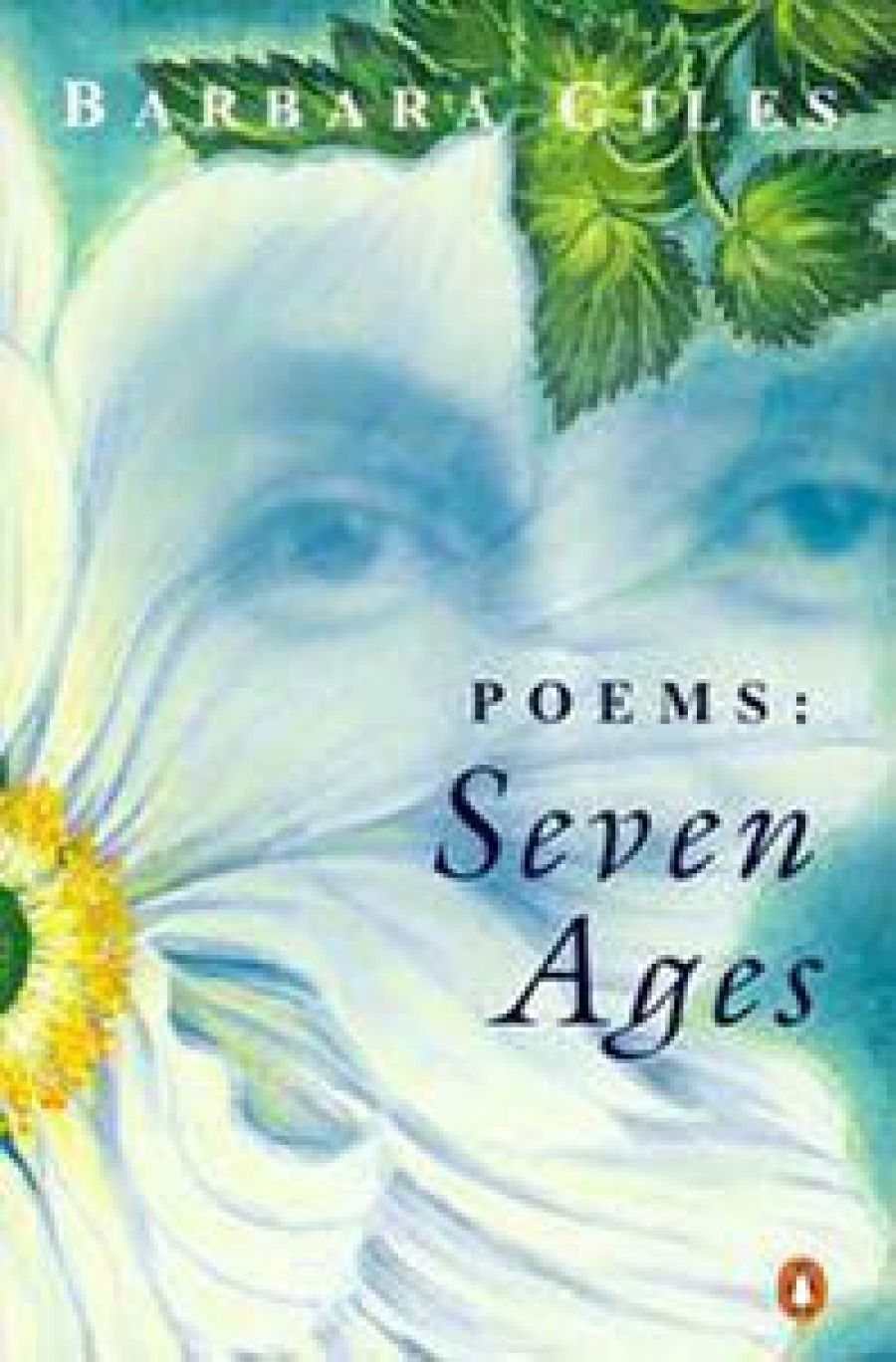
- Free Article: No
- Contents Category: Poetry
- Review Article: Yes
- Article Title: In Disguise
- Online Only: No
- Custom Highlight Text:
It is a truism that poets don’t need to write their autobiography. Roland Barthes, with his ‘death of the author’, may have thought otherwise but in Barbara Giles’ new book, Poems: Seven Ages, published in her eighty-seventh year, there is no mistaking the autobiographical core.
Though neither the title nor the blurb suggests it, Poems: Seven Ages is really a ‘selected’. Giles has gone back over her four earlier books, chosen what she (or perhaps her editor, Judith Rodriguez) thinks are the best poems and arranged them in chronological order according to subject, rather than date of composition or publication. Thus we have sections corresponding with her childhood in England, her earlier married life, her mid-life preoccupations, and the poems on women’s ageing from which she has been most anthologised.
- Book 1 Title: Poems
- Book 1 Subtitle: Seven Ages
- Book 1 Biblio: Penguin, $19.99 pb, 177 pp
Like several other notable Australian writers, Olga Masters among them, Barbara Giles has been a late starter. She was sixty-eight when her first book, Eve Rejects Apple, came out in 1978. This in some ways makes her difficult to place but there is no need to explain the impact of her best poems, particularly those dealing with old age which, as William Carlos Williams wrote, ‘gives as it/takes away’. The book’s final poem, ‘Fireworks and Champagne’ starts off pessimistically with ‘I pass among you disguised, you’ll scarcely see me/in this slack envelope, unremarkable’ but finishes defiantly by saying:
Such colour and sound, I shall shatter with joy,
leach into rivers, blow on the wind.
You can sweep me up, walk through me.
I am winning, I am becoming invisible.
Strangely however, Giles’ selection here leaves out several poems for which she is best known, particularly her ‘In the Park, Looking’, which starts with the assertive ‘I’m not too old to like the shape of a man … ’ and finishes mentally addressing the man in question: ‘If I do catch your eye/likely enough you’ll be thinking, “She has a look of my mother”.’ Perhaps Giles thought the readers could possibly have too much of such poems and left a few out in order not to ‘overdo’ it. Maybe, like Yeats and his ‘Lake Isle of Innisfree’, she did not want to be pursued by her anthology pieces.
Obviously Giles has thought for a long time on the reasons for (and consequences of) her late emergence. She is not entirely satisfied and clearly regrets the ‘lost’ years. In ‘To a Friend of Superior Achievements’ she admits to being ‘ … only a small dog, yapping’ and ‘rushing off to bark at another distraction, /then doz(ing), dreaming in doggerel’. In ‘Parnassus’ she is similarly hard on herself:
I was trying my dresses
before the mirror,
looking/or my image
in men’s eyes.
There is a certain bitterness too. ‘How did that novel begin?/ “To my wife who obtained me the quiet / to finish the book.” “Well, bully for him!”’
The irony in all this is that Giles has plainly spent her so-called ‘lost’ years in amassing the rich material that underpins the whole book. Significantly, too, she is not locked into outmoded styles which might tie these insights to manners of the period in which they were acquired. Despite her years, Giles is very much a poet of the eighties and nineties, not a mindless user of tired diction and prosody. ‘Jane rings. “Let’s do lunch”’ is how she begins the softly self-mocking ‘Argument for a Sustainable Lifestyle’. There is a judicious use of rhyme and iambic metre throughout but plenty of colloquial free verse too. The poet ranges freely, availing herself of whatever techniques will serve her purpose. Sometimes it will be a ballad, sometimes a free verse jeux d’esprit stepping down across the page.
Clearly Poems: Seven Ages is a summative book, a book designed to be left behind, to define the definitive. It’s a pity, in this case, that some important poems such as ‘In the Park, Looking’ and ‘Diminished’ have been left out – but as a testament both to Giles’ life and her work the collection is a substantial achievement. The misgivings Giles attributes to her narrator in ‘Entropy’ should hardly trouble the poet herself.
Looking back
I did it all wrong,
seeking assurances,
insuring the hours
against emptiness.
What use a barn full of straw,
clay wanting fire,
corn and no mill?
I should have woven
a prayer mat, dined
off my own flesh,
eaten myself to the bones,
ground them for bread.
In these last two autumnal decades Barbara Giles has achieved as much as many poets do in four or five.


Comments powered by CComment